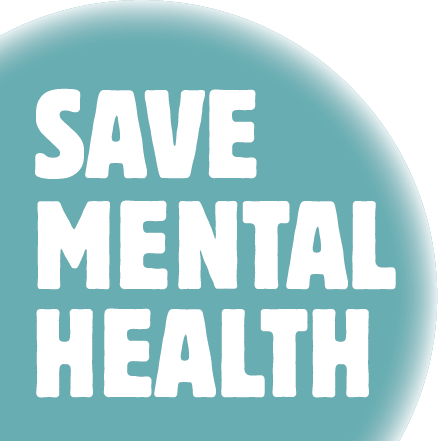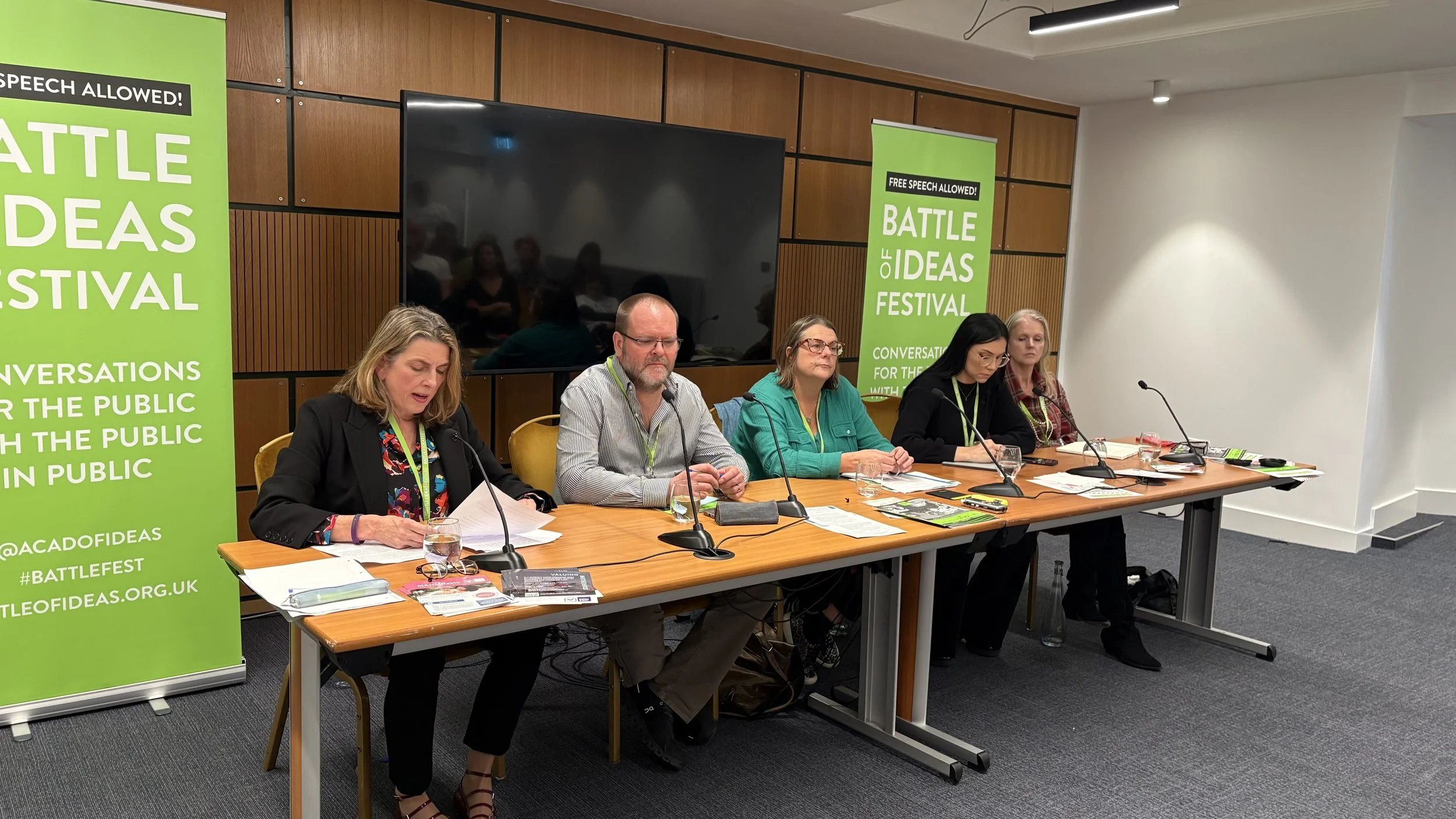Should there be a mental health professional in every school?
This is a transcript of the presentation given by Lucy Beney
at the Battle of Ideas on Saturday 18 October 2025
Should there be a mental health professional in every school? This was the title of the paper which I prepared for the excellent Family Education Trust earlier this year. Currently, around 1 in 5 children are believed to have a mental health condition. Huge numbers of school-leavers are not in education, employment or training because of poor mental health, so surely the answer should be obvious.
But we already have a greater focus on mental health within schools – and elsewhere – than at any previous time. There is a veritable army of people now working to address the problem. Unfortunately, the situation appears to be getting worse, not better. Some years ago, a study projected possible savings to future welfare bills if school counselling became more widely available. Counselling has expanded – and so has the welfare bill.
What if mental health professionals are part of the problem? In a yet-to-be-released podcast, Stella O'Malley asked me this question directly. What if focussing on feelings, making concessions in class and elevating ‘lived experience’ is undermining wellbeing? Are children encouraged to be too introspective? Are they being damagingly deprived of resilience, agency and responsibility?
In her book Bad Therapy, Abigail Shrier wisely makes the case for helping children to become task-focussed rather than feelings-focussed. She cites the example of climbing a mountain. Which approach will be more effective – thinking about how you feel as you look at the path winding up towards an invisible summit? Or focussing instead on what needs to done, here and now, to make a start?
But the 'Swiss cheese' theory is at work here. A number of things have converged for children and young people at the same time, to create the disaster which we now see unfolding.
First, children need secure attachment, clear boundaries and a shared moral framework, in order to thrive – but too many are now cut adrift from real roots and close relationships, with little meaning in life and no sense of the value of anything beyond themselves. Human beings are increasingly viewed as interchangeable. We change partners; we blend families; and we swap parents for child care professionals – but ‘child care’ is very different from the three-dimensional, long-term endeavour of raising another human being.
As the traditional family has imploded, we have lost any real sense of the importance of parenting. Many fathers are absent. We now need a campaign group to tell us that Mothers at Home Matter – do please visit their stand here. We used to know that mothers at home mattered – it was a blinding glimpse of the obvious. Now, single-earner households with a parent at home receive no financial support, while subsidising childcare hours for those with two salaries via the tax system. The result of these social changes is anxious, insecure children who are often hyper-vigilant and find it hard to build healthy relationships. Their suffering arises from what is happening to them, not what is wrong with them – but often the next step is ‘diagnosis’ and perhaps even medication.
Now to the next hole in the cheese – children immerse themselves in an alternative to the real world, to fill the gaping void at the centre of their lives. This is the online fantasy world, which unsettles, manipulates and offers the illusion of connection. They can ‘hang out’ with anonymous avatars in chat rooms; they can ‘get with’ someone, simply by exchanging explicit texts or photos. And at the tap of a button, it all goes away.
There is no lingering in the street, no mum or dad to ask how things are going, no awkward good-byes. Just a blank screen and the ever-present loneliness – enlivened with a sprinkling of anxiety and a few ambiguous emojis. This is not how children were designed to live. In the teenage years, they need ‘containment’ and real connection with parents more than ever.
The third hole in our Swiss cheese is expanding as I speak. It involves the ‘promiscuous misdiagnosis’ of mental health conditions. Not only have the criteria for 'diagnosis' expanded hugely – especially for autism and ADHD – the number of 'disorders' has also increased, despite there being no objective, clinical way in which to diagnose any of them. Diagnosis rests only on feelings and observed behaviour – which is disastrous when we live in a culture of performative victimhood. I have repeatedly witnessed children compete over ‘who is worse’ and whose dosage is higher. It brings kudos.
This is profoundly unhelpful. Anyone who feels 'different' – as most teenagers do at some point – now believes that there is 'something wrong with them’. At the same time, the tramlines of 'normal' have never been so arbitrary or narrow. We have forgotten that the strength of the human race is individual difference. Thankfully, no two of us are the same. Forget neurodiverse… we are diverse, full stop. That, however, is inconvenient in a world governed by standardised protocols, assessments and boxes to tick.
That brings me to the fourth hole. Functionally illiterate children – around 1 in 4 at the last count – progress to secondary school, despite the curriculum being largely inaccessible to them. Some missed crucial stages in primary school, others never got the hang of the basics, but they move seamlessly through the sausage machine anyway. A combination of shame and boredom results in disruptive behaviour, which then gets ‘diagnosed’. We need to address this as a matter of urgency.
Finally – the hole that completes the tunnel down which so many children are disappearing, is the wholesale adoption of Diversity, Equity and Inclusion across institutions. The thoughtless rush to include everyone and give equal weight to everything overlooks a fundamental truth. Safeguarding and child protection require discrimination, discernment and clear moral judgement.
With the push to accept every lifestyle choice, however bizarre or unhealthy; with the acceptance of a fictitious menu of ‘genders’ and sexualities; and by allowing people from ‘queer communities’ to educate children in what amounts to no more than their own dysfunction, we undermine the already-fragile foundation of children’s organically emerging identity. We expose them to concepts for which their immature minds are not ready. This sexualisation is not titillating for children – it is terrifying. It underlies much gender-confusion, along with the desire to opt-out of growing up altogether. Our children - urged at all times to ‘be kind’ – are now ill-prepared to recognise or avoid profound harm.
Think of the victims of the rape gangs, who were apparently merely making ‘lifestyle choices’. Think of the teenage girls who believe that grotesque sexual injuries are routine. Think of the child, referred for wetting the bed, who is afraid to use the bathroom in the night, because of who they might meet on the landing in their polyamorous household. We wonder why rates of anxiety and depression are rising exponentially. When anything goes, nobody actually cares. This is deeply damaging to young people’s emotional wellbeing.
DEI has also led to the use of blatant untruths and euphemisms, which most young people can see through, but don't feel they can challenge. Again, for safeguarding reasons, we need to know who is male and who is female, and yet now we have school staff prepared not just to lie, but to insist children join them in their dishonesty. The "You know that girl in class? Well now he's a boy and you will be in trouble if you 'misgender' him" attitude.
Disgracefully, the professional bodies to which most mental health professionals belong, endorse what is known as the ‘affirmative’ approach to gender-confusion. Increasingly, they wish to see standard exploratory therapy, as advocated by the Cass Review, included in any definition of conversion therapy, and therefore banned. This approach is already part of the EU’s LGBTIQ+ ‘equality strategy’. We need to keep this in mind when considering whether or not we want more mental health professionals in schools.
There are beacons of light on this dark horizon. Thoughtful Therapists, to which I belong, is one of them. Again, who would have believed we needed an organisation of that name? All therapy was supposed to be thoughtful until five minutes ago. We also have the very necessary Save Mental Health – please visit their stall here too – which campaigns to raise awareness of the ideological capture of mental health services, but there is a long way to row back.
We have more advice and expertise than ever before, but if our primary responsibility is to raise the next generation to be healthy, cohesive and resilient, we are doing a worse job than ever. Had our ancestors failed quite as spectacularly, it is unlikely that our species would have made it this far. Much of our current predicament rests on a lack of honesty, curiosity and imagination, allied with an unwillingness to value what can't easily be measured or quantified.
Children's needs are very simple and remain unchanged, while adults' expectations have changed out of all recognition – until we accept this, and return to valuing children and childhood, prioritising real relationships and providing a firm foundation and moral framework on which children can build their lives, they will continue to flounder, however many ‘mental health professionals’ there are in school.
Thank you very much.
Lucy Beney, Save Mental Health’s Correspondent on Child Mental Health.
Lucy, of Thoughtful Therapists is an Integrative Counsellor working in private practice and also a facilitator for the Tuning into Teens parenting programme




